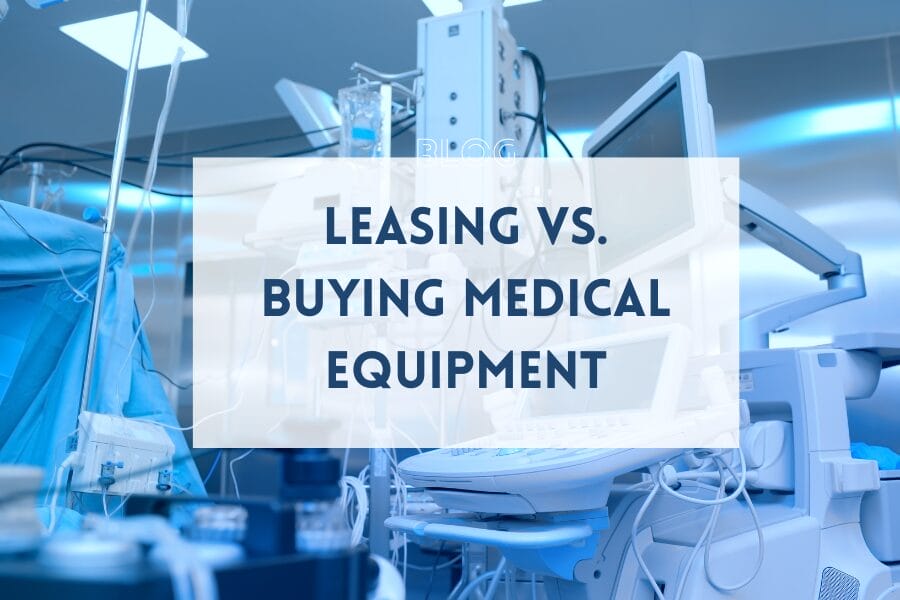When it comes to starting up and running a medical practice, one of the biggest expenses you’ll have to tackle is buying medical equipment.
There’s no way around it: You need functioning — and in some cases even state-of-the-art — tools to attract and maintain both clients and staff.
So when it comes to obtaining the estimated $50,000 to $150,000 in medical equipment you’ll need to start your practice, is it better to buy or to lease?
There’s no question that buying new or used medical equipment can save you money in the long run. However, leasing is the more common solution, since it reduces upfront costs and helps you avoid the estimated 10% annual loss of value (or depreciation) to your equipment.
Basics of medical equipment leasing
According to the Equipment Leasing and Finance Foundation, medical equipment is one of the hardest business equipment to afford without a loan or a lease.
If you don’t have the capital available to buy equipment outright, leasing can be the key to getting your medical practice up and running. Just know that from leasing fees, interest charges, and payments that don’t usually lead to ownership, leasing will eventually cost you more than buying.
Each lease agreement is different, but here are some of the common terms you can expect from a medical lease:
- Eligibility: For some leases, your credit score and business financials will impact your ability to qualify.
- Terms: Lease terms usually last three to four years, with fixed monthly or quarterly payments.
- Fees: You’ll need to make a security deposit, plus you’ll have to pay interest charges and fees that vary by lessor.
- Coverage: Some lease agreements come with maintenance coverage and repair services for the equipment.
- Equipment types: Leases are available for everything from imaging equipment to diagnostic tools.
- Building credit: Lease payments may be reported on your business credit reports and help you build your business credit.
- Lease-end: Depending on your agreement, you may have the option to buy the equipment for market value at lease end, return it, trade it in, or renew your lease.
Pros and cons of leasing medical equipment
Just because leasing is cheaper in the beginning doesn’t mean it’s the right option for you. Consider the pros and cons below before deciding if leasing is a better option than buying your medical equipment outright.
Pros
- Lower up-front investment than buying
- Lease payments are usually lower than loan payments
- You don’t lose money when the equipment depreciates
- Save money on equipment you only need for the short term
- Can be easier to qualify for than bank financing
- Ability to upgrade to newer and better technology more often
- Payments can potentially be deducted from your taxes as operating expenses
- Potential to delay the first lease payment for several months
- The equipment may be covered by a warranty or support agreement
- You may have the option to buy the equipment at a reduced price at lease-end
Cons
- More expensive overall than buying
- Your payments do not lead to property ownership
- Interest rates on leases are usually higher than loans
- Leases come with various fees that can be difficult to understand
- You can’t typically end a lease agreement early, even if you no longer need the equipment
- You can’t modify or upgrade the equipment
- You can’t claim equipment depreciation as a tax benefit
4 considerations when deciding to lease vs. buy medical equipment
For some medical practices, the choice of whether to lease or buy will vary for each piece of equipment. Here are the details to consider before deciding what to buy or lease.
Budget
If you have the capital, buying equipment outright is typically the most budget-friendly way to go. When you buy, you’ll have the freedom to modify, upgrade or sell the equipment. Plus, your payments won’t stretch out indefinitely, and you can claim depreciation for tax purposes.
Demand
Take into consideration the number of patients you have in your facility, and what equipment they rely on.
Having state-of-the-art equipment can give you the competitive advantage you need to keep those patients coming back, and for some practices, leasing is the only way to afford this equipment.
Time outlook
Do you expect your patients to have an ongoing demand for certain medical equipment? Do you plan to use the equipment for the foreseeable future?
If you only need a piece of equipment for the short term, leasing can save you significant money compared to buying. But if you need the equipment longer than the lease term — which is usually five years or less — you can save money by buying it.
Financing qualifications
Whether you want to lease or finance your equipment purchases, your ability to qualify will depend on your credit and business financials. If you have bad credit, the interest rate on an equipment loan could be as high as 25%. In this scenario, you may want to lease while you work on improving your credit and your overall chances of qualifying for a good loan.
Frequently asked questions (FAQs)
How do I choose a medical equipment leasing company?
There are steps you can take to find a reputable company from which to lease medical equipment. This includes checking industry publications, researching the company’s reputation and asking colleagues for referrals.
Is renting medical equipment the same as leasing?
No, leasing and renting medical equipment are not the same thing. With renting, you typically have access to the equipment for a few days or weeks, while leases usually last a few years.
How can my practice qualify for a medical equipment loan?
For medical equipment loans, each lending company has different requirements for your credit, business finances and other details of your business. You can apply for financing through a lender, however the Small Business Association (SBA) often has more flexible requirements for businesses with bad credit.

Joseph Muscente
Joseph is a Content Marketing Analyst at LendingTree where he works to empower people to make their best financial decisions. He earned his B.A. from Penn State University.







